sonnet18-shall i compare you to a summer day
赏析莎士比亚十四行诗第十八首

123
学教育 2010.02
硕士论坛
法一一细数开来,如明喻、暗喻、拟人、矛盾修饰 法等等,不少于十种。
明喻 (simile) 和设问(rhetoric question)的使用。 诗 歌 中 的 第 一 行 “ Shall I compare thee to a summer's day? (能不能让我来把你比作夏日?)” 就使用了明喻和设问两种修辞手法。明喻是对表面 上不相似的东西进行明确的ห้องสมุดไป่ตู้拟,找出两者的相似 之处。夏天和“你”的相似之处就是都是美的体现。 这一句同时也是一个设问句,即它形式上是个疑问 句,但不需要作答,因为它的答案本身就很清楚。 也就是说,诗人提出这个问题来并不是作回答,而 是要表达“我要将你比作夏日”,而且这个设问句用 得非常巧妙。其一它比用陈述句“I shall compare thee to a summer’ s day” 语 气 要 委 婉 礼 貌 得 多;其二是从整首诗的韵律格局来考虑的,即用“I shall”属于扬抑格,“shall I”属於抑扬格,而整 首诗的格律是五步抑扬格,所以诗人用的是“Shall I …”而不是“I shall…”,可谓一箭双雕,我们 不得不佩服他的别出心裁。
sonnet18—byWilliamShakespeare赏析
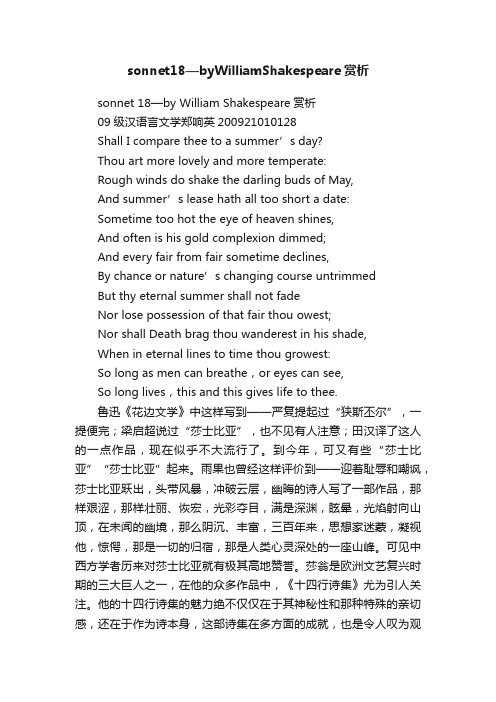
sonnet18—byWilliamShakespeare赏析sonnet 18—by William Shakespeare赏析09级汉语言文学郑响英200921010128Shall I compare thee to a summer’s day?Thou art more lovely and more temperate:Rough winds do shake the darling buds of May,And summer’s lease hath all too short a date:Sometime too hot the eye of heaven shines,And often is his gold complexion dimmed;And every fair from fair sometime declines,By chance or nature’s changing course untrimmedBut thy eternal summer shall not fadeNor lose possession of that fair thou owest;Nor shall Death brag thou wanderest in his shade,When in eternal lines to time thou growest:So long as men can breathe,or eyes can see,So long lives,this and this gives life to thee.鲁迅《花边文学》中这样写到——严复提起过“狭斯丕尔”,一提便完;梁启超说过“莎士比亚”,也不见有人注意;田汉译了这人的一点作品,现在似乎不大流行了。
到今年,可又有些“莎士比亚”“莎士比亚”起来。
雨果也曾经这样评价到——迎着耻辱和嘲讽,莎士比亚跃出,头带风暴,冲破云层,幽晦的诗人写了一部作品,那样艰涩,那样壮丽、恢宏,光彩夺目,满是深渊,眩晕,光焰射向山顶,在未闻的幽境,那么阴沉、丰富,三百年来,思想家迷蒙,凝视他,惊愕,那是一切的归宿,那是人类心灵深处的一座山峰。
英国文学史 paraphrase Sonnet 18 解释知识交流
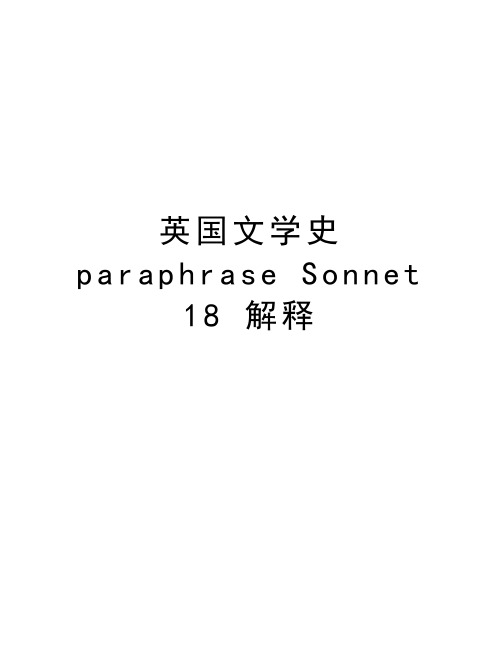
英国文学史p a r a p h r a s e S o n n e t18解释精品资料Sonnet 181. Shall I compare thee to a summer's day?Could I compare you to the time/days of summer?2. Thou art more lovely and more temperate:You are more lovely and more gentle and mild than the days.3. Rough winds do shake the darling buds of May,The wild wind shakes the favorite flowers of May.4. And summer's lease hath all too short a dateAnd the duration of summer has a limited period of time.5. Sometime too hot the eye of heaven shines,Sometimes the sun shinning is too hot.6. And often is his gold complexion dimmed,And his gold skin of the face will be dimmed by the clouds.7. And every fair from fair sometime declines,Every beautiful thing and person will decline from previous state of beauty.8. By chance, or nature's changing course untrimmed:(the beauty) will be stripped of by chance or changes of season in the nature.9. But thy eternal summer shall not fade,But your summer exists forever and will not lose color/freshness or vigor. 10. Nor lose possession of that fair thou ow'st,You will never lose your own beauty either.11. Nor shall death brag thou wander'st in his shade,The Death can’t boast that you wander in his shadow.12. When in eternal lines to time thou grow'st,You grow as time grows in the undying lines of my verse.13. So long as men can breathe, or eyes can see,So long as men can live in the world with sight and breath,14. So long lives this, and this gives life to thee.This poem will exist and you will live in it forever.仅供学习与交流,如有侵权请联系网站删除谢谢2。
Sonnet18(屠岸)
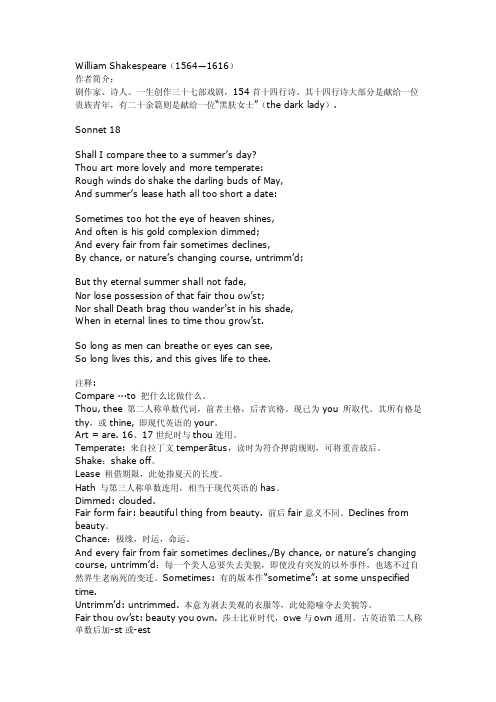
William Shakespeare(1564—1616)作者简介:剧作家、诗人。
一生创作三十七部戏剧,154首十四行诗。
其十四行诗大部分是献给一位贵族青年,有二十余篇则是献给一位“黑肤女士”(the dark lady).Sonnet 18Shall I compare thee to a summer’s day?Thou art more lovely and more temperate:Rough winds do shake the darling buds of May,A nd summer’s lease hath all too short a date:Sometimes too hot the eye of heaven shines,And often is his gold complexion dimmed;And every fair from fair sometimes declines,By chance, or nature’s changing course, untrimm’d;But thy eternal summer shall not fade,Nor lose possession of that fair thou ow’st;Nor shall Death brag thou wander’st in his shade,When in eternal lines to time thou grow’st.So long as men can breathe or eyes can see,So long lives this, and this gives life to thee.注释:Compare ···to 把什么比做什么。
Thou, thee 第二人称单数代词,前者主格,后者宾格。
现已为you 所取代。
英国文学Sonnet 18 难词解析
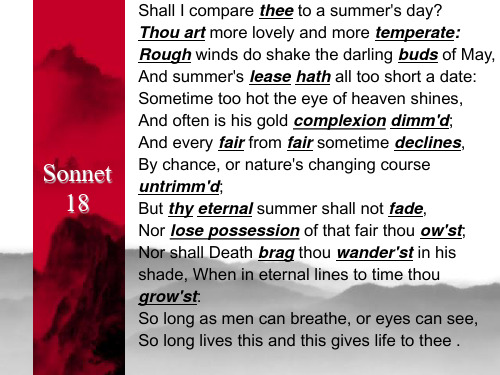
Thee [ði] ---You(宾格) 你 Thou [ðaʊ] ---You(主格)] 你,尔,汝 Thy [ðaɪ] ---Your 你的(thou的所有格) Art [ɑrt] ---Are Hath[hæθ] ---Has Ow’st---Own Wander’st---Wander Grow’st---Grow Dimm'd---Dimmed Untrimm'd---Untrimmed Examples: I shall but love thee better after death. 倘若上帝恩许,我死后将更加爱你。 Solve thou my secrets. 解答你我的秘密。
Translation
But thy eternal summer shall not fade, œ 你 久 决 会 枯, Nor lose possession of that fair thou ow'st; 你 远 会 去你 仪态; Nor shall Death brag thou wander'st in his shade, >!˛ 你 踯 , When in eternal lines to time thou grow'st: 你将 诗 与时间 ; So long as men can breathe, or eyes can see, YV 类 , 看 见, So long lives this and this gives life to thee . G 这诗 , 你 绵 。
Translation
让 来 你 拟 ? 你可 更加温 ,更加可爱: 狂风会 开 儿, 季 结 : 时 苍 巨 热, 脸 会 ; 样 ,总会 开 , 时机 谢 残; 你 久 决 会 枯, 你 远 会 去你 仪态; 你 踯 , 你将 诗 与时间 ; 类 , 看 见, 这诗 , 你 绵 。
十四行诗第十八首
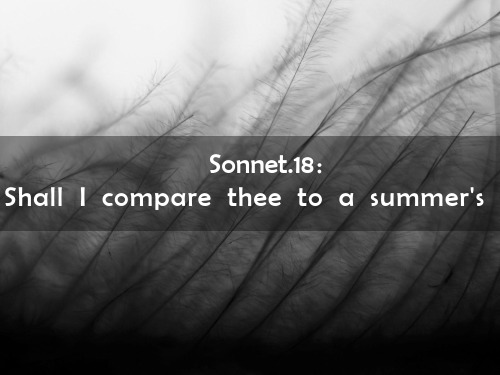
起承转合
表 年 凡头明轻响四他友的行所 人 美是歌 的 丽“颂 不 ;起的 同”承,宣貌所过后告难爱他四虽以的的行然存人不是别留却朽“人,可的转的可以诗”美他通篇, 来得以永存
合
中间四行是
最后两行是“合”,是对 一首诗所作的小结。以富
起
“承”,讲岁 月无常,青春 难驻
转有诗思歌辨艺的术以语及言所总歌结颂了对人象类、 之间的关联:只要人类尚
Part 2
诗歌欣赏
Shall I compare thee to a summer's day? Thou art more lovely and more temperate, Rough winds do shake the darling buds of May, And summer's lease hath all too short a date. Sometime too hot the eye of heaven shines, And often is his gold complexion dimm'd, And every fair from fair sometime declines, By chance or nature's changing course untrimm'd, But thy eternal summer shall not fade. Nor lose possession of that fair thou owest, Nor shall Death brag thou wander'st in his shade When in eternal lines to time thou growest. So long as men can breathe or eyes can see, So long lives this and this gives life to thee.
Sonnet 18-注音标
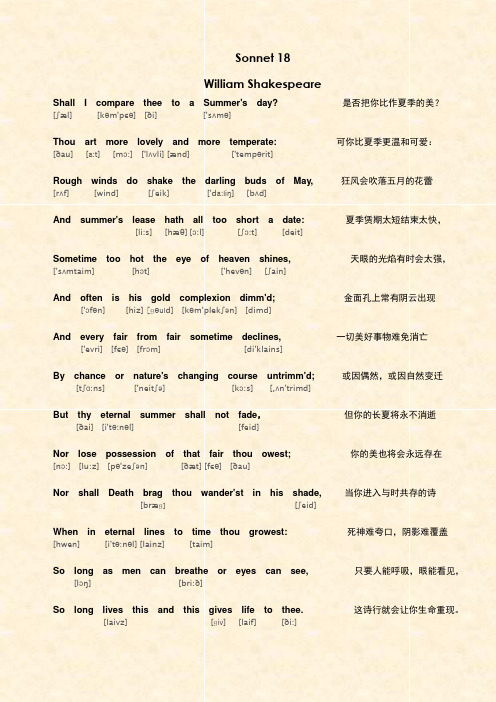
Sonnet 18William ShakespeareShall I compare thee to a Summer's day? 是否把你比作夏季的美?[ʃæl] [kəm'pεə] [ði] ['sʌmə]Thou art more lovely and more temperate: 可你比夏季更温和可爱:[ðau] [a:t] [mɔ:] ['lʌvli] [ænd] ['tempərit]Rough winds do shake the darling buds of May, 狂风会吹落五月的花蕾[rʌf] [wind] [ʃeik] ['d a:liŋ] [bʌd]And summer's lease hath all too short a date: 夏季赁期太短结束太快,[li:s] [hæθ][ɔ:l] [ʃɔ:t] [deit]Sometime too hot the eye of heaven shines, 天眼的光焰有时会太强,['sʌmtaim] [hɔt] ['hevən] [ʃain]And often is his gold complexion dimm'd; 金面孔上常有阴云出现['ɔfən] [hiz] [ɡəul d] [kəm'plekʃən] [dimd]And every fair from fair sometime declines, 一切美好事物难免消亡['evri] [fεə] [frɔm] [di'klains]By chance or nature's changing course untrimm'd; 或因偶然,或因自然变迁[tʃɑ:ns] ['neitʃə] [kɔ:s] [,ʌn'trimd]But thy eternal summer shall not fade,但你的长夏将永不消逝[ðai] [i'tə:nəl] [feid]Nor lose possession of that fair thou owest;你的美也将会永远存在[nɔ:] [lu:z] [pə'zeʃən] [ðæt] [fεə] [ðau]Nor shall Death brag thou wander'st in his shade,当你进入与时共存的诗[bræɡ] [ʃeid]When in eternal lines to time thou growest:死神难夸口,阴影难覆盖[hwen] [i'tə:nəl] [lainz] [taim]So long as men can breathe or eyes can see, 只要人能呼吸,眼能看见,[lɔŋ][bri:ð]So long lives this and this gives life to thee. 这诗行就会让你生命重现。
Comments on sonnet 18原文加解析
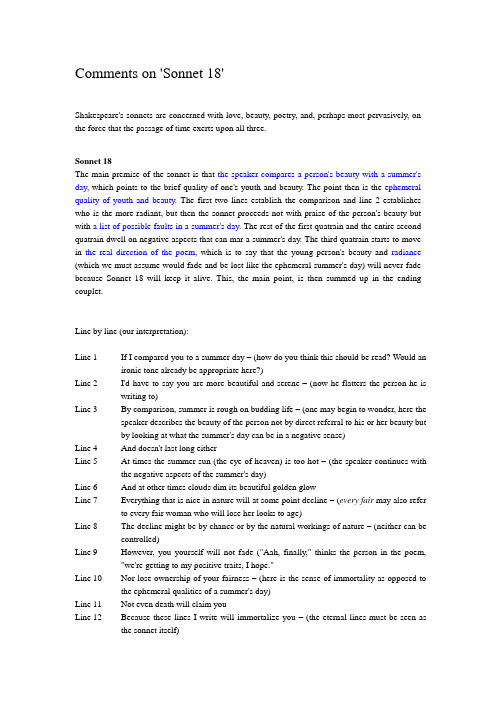
Comments on 'Sonnet 18'Shakespeare's sonnets are concerned with love, beauty, poetry, and, perhaps most pervasively, on the force that the passage of time exerts upon all three.Sonnet 18The main premise of the sonnet is that the speaker compares a person's beauty with a summer's day, which points to the brief quality of one's youth and beauty. The point then is the ephemeral quality of youth and beauty.The first two lines establish the comparison and line 2 establishes who is the more radiant, but then the sonnet proceeds not with praise of the person's beauty but with a list of possible faults in a summer's day. The rest of the first quatrain and the entire second quatrain dwell on negative aspects that can mar a summer's day. The third quatrain starts to move in the real direction of the poem, which is to say that the young person's beauty and radiance (which we must assume would fade and be lost like the ephemeral summer's day) will never fade because Sonnet 18 will keep it alive. This, the main point, is then summed up in the ending couplet.Line by line (our interpretation):Line 1 If I compared you to a summer day – (how do you think this should be read? Would an ironic tone already be appropriate here?)Line 2 I'd have to say you are more beautiful and serene – (now he flatters the person he is writing to)Line 3 By comparison, summer is rough on budding life – (one may begin to wonder, here the speaker describes the beauty of the person not by direct referral to his or her beauty butby looking at what the summer's day can be in a negative sense)Line 4 And doesn't last long eitherLine 5 At times the summer sun (the eye of heaven) is too hot – (the speaker continues with the negative aspects of the summer's day)Line 6 And at other times clouds dim its beautiful golden glowLine 7 Everything that is nice in nature will at some point decline – (every fair may also refer to every fair woman who will lose her looks to age)Line 8 The decline might be by chance or by the natural workings of nature – (neither can be controlled)Line 9 However, you yourself will not fade ("Aah, finally," thinks the person in the poem, "we're getting to my positive traits, I hope."Line 10 Nor lose ownership of your fairness – (here is the sense of immortality as opposed to the ephemeral qualities of a summer's day)Line 11 Not even death will claim youLine 12 Because these lines I write will immortalize you – (the eternal lines must be seen as the sonnet itself)Line 13 As long as men breathe and see (as long as there are people who appreciate poetry.Does this suggest the poet's self-praise of his own abilities? Y our beauty will fade, butby gosh my poetry is so good you've just been immortalized)?Line 14 We interpret "this" to be referring to the sonnet itself. So this sonnet will continue to live and it will give you immortal life.http://access-literature.cappelendamm.no/c314013/artikkel/vis.html?tid=366475This is one of the most famous of all the sonnets, justifiably so. But it would be a mistake to take it entirely in isolation, for it links in with so many of the other sonnets through the themes of the descriptive power of verse; the ability of the poet to depict the fair youth adequately, or not; and the immortality conveyed through being hymned in these 'eternal lines'. It is noticeable that here the poet is full of confidence that his verse will live as long as there are people drawing breath upon the earth, whereas later he apologises for his poor wit and his humble lines which are inadequate to encompass all the youth's excellence. Now, perhaps in the early days of his love, there is no such self-doubt and the eternal summer of the youth is preserved forever in the poet's lines. The poem also works at a rather curious level of achieving its objective through dispraise. The summer's day is found to be lacking in so many respects (too short, too hot, too rough, sometimes too dingy), but curiously enough one is left with the abiding impression that 'the lovely boy' is in fact like a summer's day at its best, fair, warm, sunny, temperate, one of the darling buds of May, and that all his beauty has been wonderfully highlighted by the comparison.Commentary1. Shall I compare thee to a summer's day?This is taken usually to mean 'What if I were to compare thee etc?' The stock comparisons of the loved one to all the beauteous things in nature hover in the background throughout. One also remembers Wordsworth's lines:We'll talk of sunshine and of song,And summer days when we were young,Sweet childish days which were as longAs twenty days are now.Such reminiscences are indeed anachronistic, but with the recurrence of words such as 'summer', 'days', 'song', 'sweet', it is not difficult to see the permeating influence of the Sonnets on Wordsworth's verse.2. Thou art more lovely and more temperate:The youth's beauty is more perfect than the beauty of a summer day. more temperate - more gentle, more restrained, whereas the summer's day might have violent excesses in store, such as are about to be described.3. Rough winds do shake the darling buds of May,May was a summer month in Shakespeare's time, because the calendar in use lagged behind the true sidereal calendar by at least a fortnight.darling buds of May- the beautiful, much loved buds of the early summer; favourite flowers.4. And summer's lease hath all too short a date:Legal terminology. The summer holds a lease on part of the year, but the lease is too short, and has an early termination (date).5. Sometime too hot the eye of heaven shines,Sometime= on occasion, sometimes;the eye of heaven= the sun.6. And often is his gold complexion dimmed,his gold complexion= his (the sun's) golden face. It would be dimmed by clouds and on overcast days generally.7. And every fair from fair sometime declines,All beautiful things (every fair) occasionally become inferior in comparison with their essential previous state of beauty (from fair). They all decline from perfection.8. By chance, or nature's changing course untrimmed:By chance accidents, or by the fluctuating tides of nature, which are not subject to control, nature's changing course untrimmed.untrimmed -this can refer to the ballast (trimming) on a ship which keeps it stable; or to a lack of ornament and decoration. The greater difficulty however is to decide which noun this adjectival participle should modify. Does it refer to nature, or chance, or every fair in the line above, or to the effect of nature's changing course? KDJ adds a comma after course, which probably has the effect of directing the word towards all possible antecedents. She points out that nature's changing course could refer to women's monthly courses, or menstruation, in which case every fair in the previous line would refer to every fair woman, with the implication that the youth is free of this cyclical curse, and is therefore more perfect.9. But thy eternal summer shall not fade,Referring forwards to the eternity promised by the ever living poet in the next few lines, through his verse.10. Nor lose possession of that fair thou ow'st,Nor shall it (your eternal summer) lose its hold on that beauty which you so richly possess. ow'st = ownest, possess.By metonymy we understand 'nor shall you lose any of your beauty'.11. Nor shall death brag thou wander'st in his shade,Several half echoes here. The biblical ones are probably 'Oh death where is thy sting?Or grave thy victory?' implying that death normally boasts of his conquests over life.And Psalms 23.3.: 'Yea though I walk through the valley of the shadow of death I will fear no evil' In classical literature the shades flitted helplessly in the underworld like gibbering ghosts. Shakespeare would have been familiar with this through Virgil's account of Aeneas' descent into the underworld in Aeneid Bk. VI.12. When in eternal lines to time thou grow'st,in eternal lines= in the undying lines of my verse. Perhaps with a reference to progeny, and lines of descent, but it seems that the procreation theme has already been abandoned.to time thou grow'st- you keep pace with time, you grow as time grows.13. So long as men can breathe, or eyes can see,For as long as humans live and breathe upon the earth, for as long as there are seeing eyes on the eart.14. So long lives this, and this gives life to thee.That is how long these verses will live, celebrating you, and continually renewing your life. But one is left with a slight residual feeling that perhaps the youth's beauty will last no longer than a summer's day, despite the poet's proud boast.ÂSonnet 18 - 'Shall I Compare Thee to a Summer's Day?'Photo © Lee JamiesonIntroductionSonnet 18 deserves its fame because it is one of the most beautifully written verses in the English language. The sonnet’s endurance comes from Shakespeare’s ability to capture the essence of love so cleanly and succinctly.After much debate amongst scholars, it is now generally accepted that the subject of the poem is male. In 1640, a publisher called John Benson released a highly inaccurateedition of Shakespeare’s sonnets in which he edited out the young man, replacing “he”with “she”.Benson’s revision was considered to be the standard text until 1780 when Edmond Malone returned to the 1690 quarto and re-edited the poems. Scholars soon realized that the first 126 sonnets were originally addressed to a young man sparking debates about Shakespeare’s sexuality. The nature of the relationship between the two men is highly ambiguous and it is often impossible to tell if Shakespeare is describing platonic love or erotic love.∙Sonnet 18: read the full text hereCommentaryThe opening line poses a simple question which the rest of the sonnet answers. The poet compares his loved one to a summer’s day and finds him to be “more lovely and more temperate.”The poet discovers that love and the man’s beauty are more permanent than a summer’s day because summer is tainted by occasional winds and the eventual change of season. While summer must always come to an end, the speaker’s love for the man is eternal. For the speaker, love transcends nature in two ways:1The speaker begins by comparing the man’s beauty to summer, but soon the man becomes a force of nature himself. In the line, “thy eternal summer shall not fade,” theman suddenly embodies summer. As a perfect being, he becomes more powerful than the summer’s day to which he was being compared.The poet’s love is so powerful that even death is unable to curtail it. The speaker’s love lives on for future generations to admire through the power of the written word –through the sonnet itself. The final couplet explains that the beloved’s “eternalsummer” will continue as long as there are people alive to read this sonnet: So long as men can breathe or eyes can see,So long lives this, and this gives life to thee.The young man to whom the poem is addressed is the muse for Shakespeare’s first 126 sonnets. Although there is some debate about the correct ordering of the texts, the first 126 sonnets are thematically interlinked and demonstrate a progressive narrative. They tell of a romantic affair that becomes more passionate and intense with each sonnet.In previous sonnets, the poet has been trying to convince the young man to settle down and have children, but in Sonnet 18 the speaker abandons this domesticity for the first time and accepts love’s all-consuming passion – a theme that is set to continue in the sonnets that follow.。
Sonnet 18赏析

n e s ,
l o s e i t s b e a u t y ,
B y c h a n c e o r n a t u r e ' s c h a n g i n g c o u r s e u n t r i m m ' d ; B u t t h y e t e r
B y m i s f o r t u n e o r b y n a t u r e ' s p l a n n e d o u t c o u r s e .
Shall I compare you to a summer’s day? You are more lovely and more constant: Rough winds shake the beloved buds of May And summer is far too short: At times the sun is too hot, Or often goes behind the clouds; And everything beautiful sometime will lose its beauty, By misfortune or by nature's planned out course. But your youth shall not fade, Nor will you lose the beauty that you possess; Nor will death claim you for his own, Because in my eternal verse you will live forever. So long as there are people on this earth, So long will this poem live on, making you immortal.
sonnet18赏析修辞手法
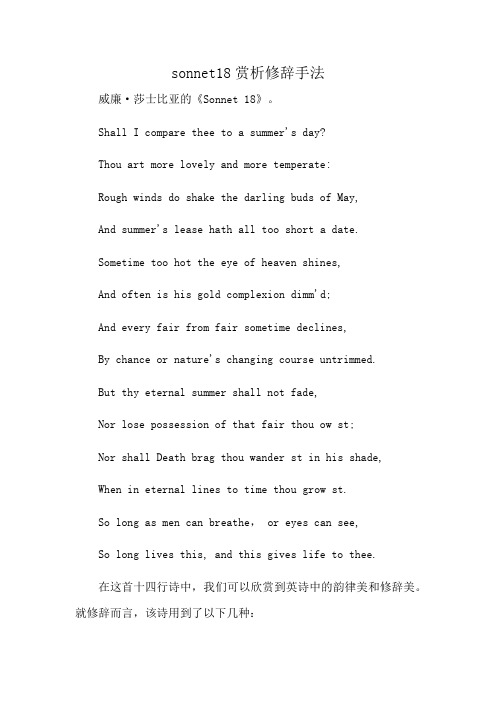
sonnet18赏析修辞手法威廉·莎士比亚的《Sonnet 18》。
Shall I compare thee to a summer's day?Thou art more lovely and more temperate:Rough winds do shake the darling buds of May,And summer's lease hath all too short a date.Sometime too hot the eye of heaven shines,And often is his gold complexion dimm'd;And every fair from fair sometime declines,By chance or nature's changing course untrimmed.But thy eternal summer shall not fade,Nor lose possession of that fair thou ow st;Nor shall Death brag thou wander st in his shade,When in eternal lines to time thou grow st.So long as men can breathe, or eyes can see,So long lives this, and this gives life to thee.在这首十四行诗中,我们可以欣赏到英诗中的韵律美和修辞美。
就修辞而言,该诗用到了以下几种:明喻(Simile)/设问(Rhetorical Question):Shall I compare thee to a summer's day? Thou art more lovely and more temperate.诗人把好友Herbet比作夏日,并就此提出疑问“我应把你比作夏日吗?”,但随之又否定了自己的想法,因为他认为Herbet那更可爱更柔和的美胜过夏日。
莎士比亚十四行诗第十八首

莎士比亚十四行诗第十八首Sonnet 18 铁冰译文1 Shall I compare thee to a summer's day 我该不该把你比作怡人的夏天?2 Thou art more lovely and more temperate: 你却比她更加可爱更加温情。
3 Rough winds do shake the darling buds of May, 五月的娇蕊总是被狂风吹断,4 And summer's lease hath all too short a date: 夏天也只是一道短暂的美景。
5 Sometime too hot the eye of heaven shines, 苍穹的目光有时会过于灼热,6 And often is his gold complexion dimm'd; 那金色的脸庞也常黯淡无光。
7 And every fair from fair sometime declines, 人间一切瑰丽终将失去秀色,8 By chance, or nature's changing course, untrimm'd; 湮没于不测风云和世事沧桑。
9 But thy eternal summer shall not fade, 但是,你常青的夏季永不消逝,10 Nor lose possession of that fair thou owest; 你拥有的美丽也将永不折损,11 Nor shall Death brag thou wander'st in his shade, 或许死神的阴影会笼罩着你,12 When in eternal lines to time thou growest; 你却和这不朽的诗句千古长存。
13 So long as men can breathe, or eyes can see, 只要人类还在呼吸、眼睛还在欣赏,14 So long lives this, and this gives life to thee. 我的诗就会活着,令你生命绽放。
十四行诗之十八译文
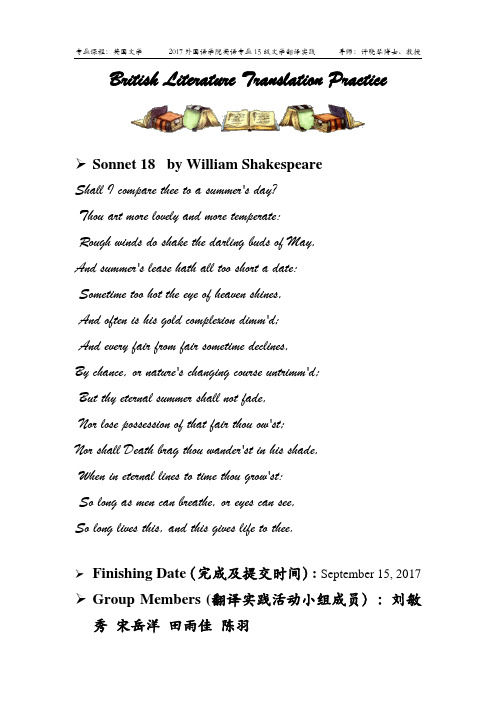
Sonnet 18 by William ShakespeareShall I compare thee to a summer's day?Thou art more lovely and more temperate:Rough winds do shake the darling buds of May,And summer's lease hath all too short a date:Sometime too hot the eye of heaven shines,And often is his gold complexion dimm'd;And every fair from fair sometime declines,By chance, or nature's changing course untrimm'd;But thy eternal summer shall not fade,Nor lose possession of that fair thou ow'st;Nor shall Death brag thou wander'st in his shade,When in eternal lines to time thou grow'st:So long as men can breathe, or eyes can see,So long lives this, and this gives life to thee.Finishing Date(完成及提交时间): September 15, 2017 Group Members (翻译实践活动小组成员):刘敏秀宋岳洋田雨佳陈羽Chinese Translation(译文)这夏,真的可以与你媲美吗?你时而迷人,时而温婉。
刚风落了五月的初蕾,夏日的生命未免太短。
莎诗第18
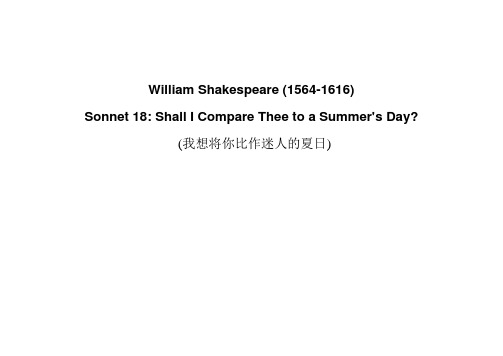
William Shakespeare (1564-1616)Sonnet 18: Shall I Compare Thee to a Summer's Day?(我想将你比作迷人的夏日)Shall I /compare /thee to/ a sum/mer's day? a Thou art /more love/ly and /more tem/perate. b Rough winds do shake the darling buds of May, a And summer's lease hath all too short a date. bSometime too hot the eye of heaven shines,And often is his gold complexion dimm'd;And every fair from fair sometime declines,By chance or nature's changing course untrimm'd; But thy eternal summer shall not fadeNor lose possession of that fair thou ow'st;Nor shall Death brag thou wander'st in his shade, When in eternal lines to time thou grow'st: So long as men can breathe or eyes can see,So long lives this, and this gives life to thee.译本一:能不能让我来把你比拟做夏日?你可是更加温和,更加可爱:狂风会吹落五月里开的好花儿,夏季的生命又未免结束得太快:有时候苍天的巨眼照得太灼热,他那金彩的脸色也会被遮暗;每一样美呀,总会离开美而凋落,被时机或者自然的代谢所摧残;但是你永久的夏天决不会凋枯,你永远不会失去你美的仪态;死神夸不着你在他的影子里踯躅,你将在不朽的诗中与时间同在;只要人类在呼吸,眼睛看得见,我这诗就活着,使你的生命绵延。
sonnet 18 的逐句解析

Sonnet 18原文1: Shall I compare thee to a summer’s day?释义1: Can I compare you to a summer’s day? In England, summer is the best season of a year, because summer brings warmer and sunnier weather compared to the other seasons. This change in climate allows people to spend more time outdoors, enjoy outdoor activities, and experience longer daylight hours.原文2: Thou art more lovely and more temperate.释义2: “More lovely” means that “you” are more beautiful or attractive. “More temperate” suggests that “you” possesses a more moderate and balanced temperament or nature.原文3: Rough winds do shake the darling buds of May.释义3:⚫“Rough winds” refers to strong or harsh winds, highlighting the forceful nature of the weather. ⚫“Do shake” indicates that the rough winds are causing a shaking or disturbance.⚫“The darling buds of May” refers to the delicate and beloved flower buds that bloom in the month of May.It symbolizes the beauty and potential of nature. this line portrays the vulnerability and fragility of nature. It suggests that even the most cherished and delicate aspects of life, represented by the tender flower buds of May, are not immune to the turbulent forces of the world, here represented by the rough winds.原文4: And Summer’s lease hath all too short a date释义4:⚫“And Summer’s lease” refers to the limited time or duration of summer.⚫“Lease” here can be understood as a leasehold or a period of time.⚫“Hath all too short a date” means that the time allocated to summer is considered too brief or insufficient. this line expresses the speaker’s sadness about the fleeting nature of summer.It reflects the common experience of longing for the summer season to last longer, as the warmth, beauty, and enjoyment associated with summer are cherished but inherently temporary.原文5: Sometime too hot the eye of heaven shines,释义5: the eye of heaven here refers to the sun, and Shakespeare suggests that sometimes the sun shines too intensely or with excessive heat. In Shakespearean sonnets, the “eye of heaven” is often associated with beauty, light, and divine power. By suggesting that the eye of heaven shines too hot, the speaker could be expressing the idea that even the most beautiful and powerful things can sometimes be overwhelming or excessive.原文6: And often is his gold complexion dimm’d:释义6: In this line, Shakespeare continues to describe the sun and its changing appearance, the phrase “his gold complexion” refers to the sun’s radiant and golden appearance. The word “dimm’d” suggests that the sun’s brightness or brilliance is frequently diminished because of the clouds. Connected with the previous line, Shakespeare tries to point out that the sun is sometimes too hot,too shiny, sometimes be covered by clouds or diminished in time.原文7: And every fair from fair sometime declines释义7: The word “fair” here refers to anything that is beautiful or lovely. This line suggest that everything beautiful eventually loses its beauty or fades away, all the beautiful things will eventually decline or deteriorate over time.原文8: By chance, or nature’s changing course untrimm’d;释义8: The phrase “by chance” refers to the possibility that beauty may fade away unexpectedly, without any specific reason or cause. The expression “nature’s changing course untrimm’d” indicates that the fading of beauty is a natural and inevitable process. It emphasizes the idea that even nature itself, with its constant cycles and changes, does not intervene or alter this course. The word “untrimm’d” suggests that beauty is not preserved or maintained, but is subject to the natural order of things.原文9: But thy eternal summer shall not fade,释义9: Your beauty will not fade away or lose brightness, your beauty will always be remembered no mater how the nature’s course changed.原文10: Nor lose possession of that fair thou ow’st,释义10: You will never lose your inherent beauty or the qualities that make you attractive. It suggests that your beauty is a part of who you are and will always belong to you.原文11: Nor shall death brag thou wander’st in his shade,释义11: Even death will not be able to claim or overshadow the person’s beauty原文12: When in eternal lines to time thou grow’st;释义12: “eternal lines” here refers to this sonnet, you will grow in these lines, this sonnet, I will immortalize your beauty.原文13: So long as men can breathe or eyes can see,原文14: So long lives this, and this gives life to thee.释义: As long as men are alive and able to see, this poem will continue to exist and will give life to you, in this sonnet, Shakespeare is expressing the timeless nature of his poetry. He claims that as long as humanity exists and can appreciate beauty, his words will endure, immortalizing the subject of the poem and preserving their memory。
sonnet 18—by William Shakespeare赏析

sonnet 18—by William Shakespeare赏析09级汉语言文学郑响英200921010128Shall I compare thee to a summer’s day?Thou art more lovely and more temperate:Rough winds do shake the darling buds of May,And summer’s lease hath all too short a date:Sometime too hot the eye of heaven shines,And often is his gold complexion dimmed;And every fair from fair sometime declines,By chance or nature’s changing course untrimmedBut thy eternal summer shall not fadeNor lose possession of that fair thou owest;Nor shall Death brag thou wanderest in his shade,When in eternal lines to time thou growest:So long as men can breathe,or eyes can see,So long lives,this and this gives life to thee.鲁迅《花边文学》中这样写到——严复提起过“狭斯丕尔”,一提便完;梁启超说过“莎士比亚”,也不见有人注意;田汉译了这人的一点作品,现在似乎不大流行了。
到今年,可又有些“莎士比亚”“莎士比亚”起来。
雨果也曾经这样评价到——迎着耻辱和嘲讽,莎士比亚跃出,头带风暴,冲破云层,幽晦的诗人写了一部作品,那样艰涩,那样壮丽、恢宏,光彩夺目,满是深渊,眩晕,光焰射向山顶,在未闻的幽境,那么阴沉、丰富,三百年来,思想家迷蒙,凝视他,惊愕,那是一切的归宿,那是人类心灵深处的一座山峰。
莎士比亚Sonnet18
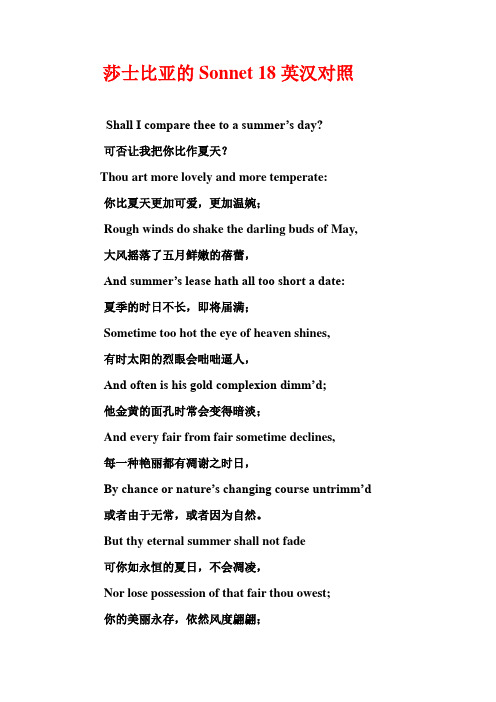
莎士比亚的Sonnet 18英汉对照Shall I compare thee to a summer’s day?可否让我把你比作夏天?Thou art more lovely and more temperate:你比夏天更加可爱,更加温婉;Rough winds do shake the darling buds of May, 大风摇落了五月鲜嫩的蓓蕾,And summer’s lease hath all too short a date:夏季的时日不长,即将届满;Sometime too hot the eye of heaven shines,有时太阳的烈眼会咄咄逼人,And often is his gold complexion dimm’d;他金黄的面孔时常会变得暗淡;And every fair from fair sometime declines,每一种艳丽都有凋谢之时日,By chance or nature’s changing course untrimm’d 或者由于无常,或者因为自然。
But thy eternal summer shall not fade可你如永恒的夏日,不会凋凌,Nor lose possession of that fair thou owest;你的美丽永存,依然风度翩翩;Nor shall Death brag thou wander’st in his shade,死神的遮蔽不过是它的夸口When in eternal lines to time thou growest:不朽的诗行将记录你的娇妍。
So long as men can breathe or eyes can see,只要有人一息尚存、双眸能视,So long lives this and this gives life to thee.这首小诗就会留芳,赐你生机无限。
- 1、下载文档前请自行甄别文档内容的完整性,平台不提供额外的编辑、内容补充、找答案等附加服务。
- 2、"仅部分预览"的文档,不可在线预览部分如存在完整性等问题,可反馈申请退款(可完整预览的文档不适用该条件!)。
- 3、如文档侵犯您的权益,请联系客服反馈,我们会尽快为您处理(人工客服工作时间:9:00-18:30)。
凭借诗的力量,他可以使他爱友的美永远存在,能征服一切的“死神”也无法对付诗歌的威力。显然,这是对诗歌艺术力量的赞颂,突出地表现了本诗的第二个主题,转折自然,衔接紧密,同时扩大了本诗的内涵。
最后两行实际上是全诗的总结,只要诗行存在,他爱友的美就存在;诗歌不朽,他爱友的美就不朽。两方面都兼顾到了,既达到了高度赞美他爱友的美的目的,又赞美了诗歌艺术不朽的力量。
When in eternal lines to time thou grow'st.
So long as men can breathe, or eyes can see,
So long lives this, and this gives life to thee.
十四行诗 第十八首
这首十四行诗艺术的另一个特点就是语言生动,比喻新颖。诗人在短短的十四行诗中运用了多种修辞手段,其中有反诘句(rhetorical question),有各种比喻,如暗喻(metaphor)、 换喻(metonymy)和提喻 (synecdoche),还有拟人(personification)和夸张(hyperbole)等。由于诗人运用了这些修辞手段,这就使得这首诗语言更简洁,形象更鲜明,蕴涵更丰富,从而大大加强了这首诗的表现力。
By chance, or nature's changing course, untrimm'd
But thy eternal summer shall not fade,
Nor lose possession of that fair thou ow'st:
Nor shall Death brag thou wand'rest in his shade,
这首诗的艺术特点首先是在于它有着双重主题:一是赞美诗人爱友的美貌,二是歌颂了诗歌艺术的不朽力量。其次就是诗人在诗中运用了新颖的比喻,但又自然而生动。
诗人一开头就把他的爱友比作美好的“夏季”。英国的夏天相当于我国的春天或春末夏初,这是一年中最美好的季节,风和日暖,枝头绿叶冒新芽,百花含苞待开放,大地充满一派生机活力(原诗中的“the darling buds”象征着生机和活力),迷人可爱。诗人把爱友比作“夏天”,其目的就是要唤起读者这样美好的想象。但是诗人觉得这个比喻还不足以表达他对爱友的赞美,因为夏天虽然温和可爱,但由于各种“偶然”原因,或因自然时序的变迁,
只要人能呼吸,眼能看见,
这诗行பைடு நூலகம்会让你生命重现。
赏析
传统的十四行诗都是以写男女爱情为主题的,如果不知道莎士比亚十四行诗的有关背景,也许会把它的154首十四行诗全当成是写给他的一位女友的,其实,在前面的“诗人简介”中已提到,莎士比亚154首十四行诗中的前126首是写给他的一位男友的,这第八首十四行诗当然也不例外,但我们不妨也可以把它当成一首爱情诗来读。这首十四行诗是莎士比亚154首十四行诗中最著名的一首,无论是选集或是教科书,这首诗都在必选之列。
Sonnet 18
William Shakespeare
Shall I compare thee to a summer's day?
Thou art more lovely and more temperate:
Rough winds do shake the darling buds of May,
威廉·莎士比亚
是否把你比作夏季的美?
可你比夏季更温和可爱:
狂风会吹落五月的花蕾,
夏季赁期太短结束太快,
天眼的光焰有时会太强,
金面孔上常有阴云出现:
一切美好事物难免消亡,
或因偶然,或因自然变迁;
但你的长夏将永不消逝,
你的美也将会永远存在:
当你进入与时共存的诗,
死神难夸口,阴影难覆盖:
And summer's lease hath too short a date,
Sometime too hot the eye of heaven shines,
And often is his gold complexion dimm'd:
And every fair from fair sometime declines,
狂风会吹落五月的花蕾,
夏季赁期太短结束太快,
天眼的光焰有时会太强,
金面孔上常有阴云出现。
换言之,夏天虽然美好,但不可能常驻,和一切美好的事物一样,终会消逝。同样,他爱友的美也不可能长驻不衰。如何能使他爱友的美永不消逝,永远存在呢?诗人在9到12行中提到了诗的力量:
当你进入永恒不朽的诗,
